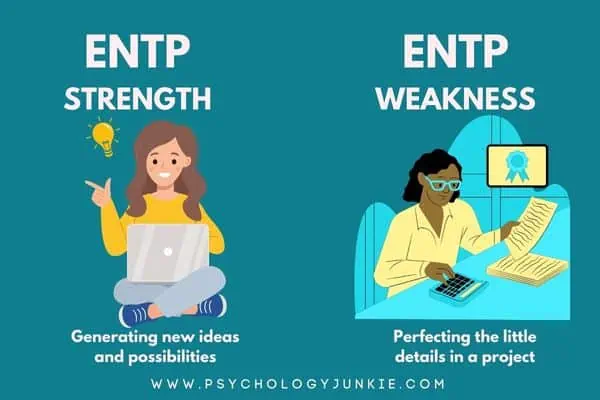The Achilles’ Heel of Every Myers-Briggs® Personality Type
Everyone has that one glaring weak spot—their Achilles’ heel—that trips them up just when they think they’ve got life figured out. It’s like that moment when you confidently walk into a glass door because you thought it was open (don’t worry, I’ve been there). Personality types are no different. Each of the 16 Myers-Briggs® types comes with its own unique challenges. As an MBTI® practitioner, I’ve seen these patterns play out countless times—from the ENFP drowning in a sea of ideas to the ISTJ holding onto ‘tried-and-true’ like it’s a life raft. Let’s dive in and uncover these vulnerabilities—not to judge, but to learn and grow from them.
Not sure what your personality type is? Take our personality questionnaire here. Or you can take the official MBTI® here.

Estimated reading time: 10 minutes
The ENFP:
ENFPs are idea machines—throw a problem their way, and they’ll generate a hundred creative solutions in no time. But here’s the problem: they’re so in love with brainstorming that the whole ‘finishing things’ part can feel like a cruel joke. Long-term projects? Unless it’s shiny and new, it can start to feel like a black hole of boredom. They tend to be driven by ideas rather than practicalities, and this can actually cause them to struggle to achieve their dreams.
Read This Next: 10 Things You Should Never Say to an ENFP
The ENTP
ENTPs are like intellectual adrenaline junkies—they thrive on the thrill of chasing ideas. The problem? Sometimes they’re so busy hopping from one shiny idea to the next that they forget to actually finish anything. Sticking with a project? Meh. There’s always another rabbit hole calling their name. As a result they can get bored or distracted after working for a prolonged time on the same project. So many new and tempting possibilities tend to play on their mind, begging them to follow them down yet another rabbit hole. While many ENTPs (and ENFPs) achieve many of their goals, it usually requires personal growth and maturity for them to stay on track and not sidestep onto another new, interesting plan or possibility.
Read This Next: 10 Things You Should Never Say to an ENTP
The INFP
INFPs are on a soul-searching journey to find meaning in life. They’re the kinds of people who know what they stand for, what feels right or wrong, and how to follow their hearts. But dealing with a bunch of technical analysis that has nothing do with emotions? Hard pass. They tend to dislike dealing with metrics, rules, and a lot of logical critique. This can mean that they dream up incredible ideas but struggle to bring them to fruition.
Read This Next: 10 Surprising Truths About INFPs
The INTP
INTPs are the walking Wikipedia of the personality world—logical, independent, and endlessly curious. But their obsession with accuracy can make them impatient with small talk or emotions. If someone doesn’t ‘make sense,’ the INTP might zone out or dismiss them as irrelevant—sometimes to the detriment of their relationships. Because their least-favored process is Feeling, they can seem tactless, arrogant, and out of touch with the needs of others. They can fall into the habit of assuming they know what someone else is going to say and tuning them out so they can think about more interesting subjects.
Read This Next: Understanding INTP Thinking
The ENFJ
ENFJs are the human equivalents of warm hugs—they live to lift others up. But their Achilles’ heel is their fear of causing harm. Sometimes they sugarcoat criticism so much that the other person has no idea what went wrong. And because they take on so much, they can overcommit and burn out in their quest to help everyone. They may find it impossible to decide on something that could affect others in negative ways and get stuck in indecision or making decisions that please others but leave them feeling dissatisfied and unhappy in the long run.
Read This Next: ENFJs, INFJs and Empathy Burnout
The ENTJ
ENTJs are natural-born strategists—ruthlessly efficient and forward-thinking. The catch? They can bulldoze over people’s feelings without even realizing it. A little tact goes a long way, but for an ENTJ, slowing down to ‘soften the blow’ can feel like a waste of time. They can behave in ways that are insensitive, brusque, or overly-critical. They can also become arrogant when dealing with people who they perceive as having trivial, unimportant interests. When they’re in charge of people, they can become overbearing and bossy if others don’t move at the same pace as they do. They can be extremely strong leaders, but working on some tact can help them to achieve their goals and motivate people much more quickly.
Read This Next: 10 Things You Should Never Say to an ENTJ
The INFJ
INFJs are big-picture visionaries, often spotting connections others miss. But their focus on the grand plan can mean the small stuff gets ignored. They can also become so married to their own views and insights that they are dismissive of people with competing views. Their single-mindedness and vision can make them inflexible and unwilling to modify their course of action. For the INFJ, life is about finding that one vision, that one right course to follow. So when someone comes along and tells them to veer off-path, it can feel like a punch in the gut, even if it’s the most logical thing to do.
Read This Next: Understanding INFJ “Grip” Stress
The INTJ
INTJs are strategic masterminds with a knack for long-term planning. But their Achilles’ heel? Enjoying the moment. They may get stuck in a perpetual state of planning, envisioning, and strategizing at the expense of enjoying, experiencing, and resting. Many INTJs perpetually kick the can of happiness down the road because they’re so busy planning for something “greater.”
Read This Next: 3 Weird and Wonderful Secrets About the INTJ
The ESFP
ESFPs are a rare combination of realism and passion, always up for fun and excitement. Their weakness? Impulsivity. They sometimes leap before they look, overfilling their schedules and regretting it later when commitments pile up.They like to know a wide variety of people and they want to experience every enjoyment the world has to offer. However, because their least-preferred process is Intuition, they can struggle to see the future implications of their current decisions. They might “leap before they look” and wind up regretting it later.
You might also enjoy: What You Crave More Than Presents, Based On Your Personality Type
The ESTP
ESTPs are action-oriented realists, thriving on the thrill of the moment. Their Achilles’ heel? Overlooking long-term consequences. Big-picture thinking can feel like a drag when there’s fun to be had right now. Because their least-favored mental process is Intuition, they can struggle to see the future implications of their decisions. They can be so focused on action and activity that they become bored and restless when conversation gets too theoretical or abstract. This can leave them missing out on deeper bonding and meaningful moments with the people they care about. They can also forget to stop and analyze the big picture and what’s really important in the grand scheme of things.
The ISFP
ISFPs are heart-driven creatives, living by their values. Their vulnerability? Dealing with metrics, planning, and critique. Since their least-preferred mental process is Thinking, they can struggle to keep an objective frame of mind in their life decisions. They may take things personally that weren’t meant to be, or they may make choices that are in line with their goals but lack the objective framework needed to become real. It’s helpful for these types to have some Thinking friends to help back them up if they have to make a decision that might feel painful (for example, firing someone who’s not pulling their weight) or if they need to figure out a way to create a sequential plan to achieve a long-term goal.
You might also enjoy: The Best 2025 Shows to Stream, Based On Your Personality Type
The ISTP
ISTPs are the cool, collected problem-solvers, always ready with a practical fix. Their weakness? Emotional dynamics. They might avoid messy feelings altogether, brushing off conflicts and inadvertently creating tension. Since their least-preferred process is Feeling, they can struggle to deal with sensitive emotional issues. This can result in strained relationships with the people they care about.
The ESFJ
ESFJs are nurturing and responsible, deeply devoted to the people around them. Their Achilles’ heel? Overinvolvement. They can get so wrapped up in others’ needs that they neglect their own or take constructive criticism too personally. Since their least-preferred function is Thinking, they can struggle to evaluate situations objectively. If they have to make a decision where others are involved, it’s hard for them to focus purely on the logic or what makes sense for them. They tend to feel insulted even when criticism was given constructively or there was no offense meant to be given. They can also become overly wrapped up in the cares of others and forget to take care of their own needs and desires. It’s important for them to pause and consider their own values, desires, and needs before they over-commit to others.
Discover more about ESFJs: The Four Personality Types ESFJs Clash with the Most
The ESTJ
ESTJs are natural managers, quick to spot inefficiencies and fix them. Their weakness? Being too blunt. Their drive for perfection can sometimes come across as bossy, stepping on toes without meaning to. They may consider the values of others as irrelevant to a decision and inadvertently cause conflict or chaos in their relationships. They also can come across as bossy or demanding because they are naturally wired to spot errors and flaws and point them out. It can be helpful for them to pause before saying anything and consider how they could frame their words tactfully.
The ISFJ
ISFJs are known for their empathy, practicality, and attention-to-detail. However, because their least-preferred process is Intuition, they can struggle to see possibilities or options that don’t already exist. They can become so focused on using methods that they know and trust that they struggle to find new solutions when an unusual problem presents itself. They can also struggle to see the big picture at times, becoming fixated on details and trying to deal with them without considering the long-term future impacts. It can be helpful for sensors and intuitives to be friends because sensors can help intuitives to see important details and present realities, while intuitives can help sensors to see the bigger picture and likely future implications.
Find out more about ISFJs: 30 Day Personal Growth Challenge for ISFJs
The ISTJ
ISTJs are known for being detail-oriented, logical, and responsible. They are usually hard-working people who are deeply devoted to their communities. However, because their least-preferred process is Intuition, they can be overly-skeptical of new ways of doing things. They may become so reliant on tried-and-true methods that they fail to see innovations or changes as positive. Because they tend to focus on details more than the global picture, they can lose sight of the “forest for the trees” in a sense. As ISTJs develop and mature this tends to become less and less of a problem.
Want to Share Your Thoughts?
Let us know what you think in the comments!
Find out more about your personality type in our eBook, Discovering You: Unlocking the Power of Personality Type.


























I absolutely love your posts! I am 100% INTJ. I had typed as an INFJ on multiple online tests but I went ahead and took the paid for version of the testing and I was very close to an INFJ but was actually an INTJ. Reading about the INTJ is almost as if someone has watched me and written down my actions, lol. It’s very freeing to start to understand yourself and be able to not dislike yourself for some of the odder things that your personality might do-as well as find actual ways to self improve that are realistic! Thank you!
Thanks so much! I’m really glad you’re enjoying the posts and are on your way to understanding yourself more fully!
How do you know which type you are? Thanks
Personalityhacker.com has a really good test, or you can take a test on the official MBTI® web site. I find the best way is to take a test, but also study the cognitive functions to determine which ones seem the most natural to you 🙂